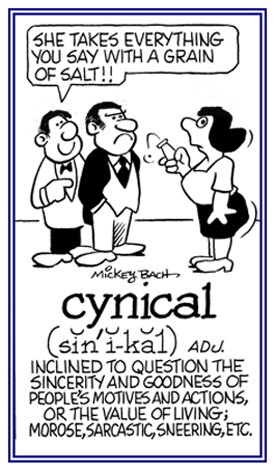cyno-, cyn-, kyno-, kyn-
(Greek: dog; like a dog)
Dogbanes are perennial herbaceous plants, with poisonous milky juice, bearing slender pods in pairs; said to be poisonous to dogs.
2. A contemptible person; an offensive term for someone regarded as mean, cowardly, or otherwise unpleasant.
3. Etymology: Middle English curre, perhaps of Scandinavian origin; however, it is not directly related to this Latin cyno-, "dog" family. It has been included because of its significance to the "dog" topic presented in this unit.
2. Snarling and bad-tempered.
3. Etymology: from about 1175–1225; Middle English curre; apparently shortened from curdogge, "a worthless dog".
2. Resembling a cur; like a mongrel (dog that is a mixture of different breeds).
3. Etymology: this term is NOT related to the Latin cyno- family; however, it was placed here because of its relevance to this unit.
"The currishness of the couple resulted in their having an irritable and unpleasant disposition while they were discussing how much they would be spending for the trip."
2. Insanity in which the patient behaves like a dog: Jim's father started to have delusions during which he barked and growled, imagining himself to be a dog.
2. The study of canine diseases.
2. A person whose outlook is scornfully and often habitually negative.
A Cynic was an ancient Greek philosopher or a member of a group of ancient Greek philosophers who believed that virtue is the only good and that the only means of achieving it was through self-control. The sect was founded by Antisthenes in the 4th century B.C. From Greek kunikos and then through Latin cynicus, "dog".
These sect members had a doglike insolence, a doglike disregard for social customs, a doglike use of tubs or kennels for sleeping, and a currish insistence upon one's own opinion. It may have been a coincidence that the Greek word for "doglike" is cynikos.
The word cynic had not been in English very long before it was applied to any faultfinding critic, especially to someone who doubts the sincerity of all human motives except self-interest.
The Greek word kunikos, from which "cynic" comes, was originally an adjective meaning "doglike", from kuōn, "dog".
The word was probably applied to the Cynic philosophers because of the nickname kuōn given to Diogenes of Sinope, the prototypical Cynic.
The first use of the word recorded in English, in a work published from 1547 to 1564, is in the plural for members of this philosophical sect. In 1596, we find the first instance of cynic meaning "faultfinder", a sense that was to develop into our modern-English usage.
The meaning "faultfinder" came naturally from the behavior of countless Cynics who in their pursuit of virtue pointed out the various flaws in others. Such faultfinding could led to the belief associated with cynics of today that selfishness determines human behavior.
With his cynical attitude, Adam doesn't trust anyone.


Go to this Word A Day Revisited Index
so you can see more of Mickey Bach's cartoons.
2. A scornfully or jadedly negative comment or act.
3. Cynicism: The beliefs of the ancient Cynics.
Related "dog" word family: cani-.

